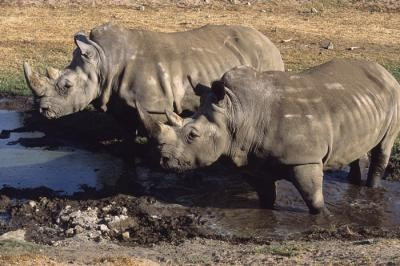Rhino Horn Poaching Fuelled by 'Respectable' Speculators Betting on Species Extinction

A rhino crisis fuelled by exploding demand from Asia for horn threatens to wipe out the species, fear conservationists.
The pro-rhino horn trade lobby argues that a controlled, legal business would undermine the black market and poaching. Nobody has disputed that the scale of slaughter of the animal for their horn is reaching crisis point.
South Africa, which has the continent's most sophisticated anti-poaching structure, lost only 15 rhinos to poaching from 1990-2005. This year alone, that figure has rocketed to 339.
Scientists estimate that there are around 21,000 white rhino and at least 4,800 black rhino left in Africa.
On the black market, rhino horn is currently worth more than its weight in gold.
What is fuelling demand in China and Vietnam are powerful beliefs in the healing properties of rhino horn with no basis in medical fact, according to the Environmental Intelligence Agency (EIA).
Consumers believe powdered rhino horn boosts sexual performance, can cure cancer and can be used as a versatile cure-all for sick children where more conventional treatments have failed.
Its soaring value is turning it into a trade commodity in its own right. A report by Traffic, the wildlife trade monitoring network, even found rhino horn being used as a deposit for a luxury car.
A criminal issue
But EIA executive director Mary Rice dismissed the idea that a controlled market could dampen the black market and kill poaching.
She told IBTimes UK: "Traditionally, this has been a wildlife issue but it's a criminal issue, just like diamond smuggling or people trafficking, The organised criminal networks are sophisticated.
"It is a syndicate involving people from all sections of society. The burgeoning trade encourages crime because there are a lot of firearms and these guys are poor.
"Rhino poaching is a low-risk, high-reward activity, but the poachers do not see much of the money.
"We want to see no trade at all and a complete ban on trade," she added.
"Governments need to adopt a more intelligence-led approach to the problem. For every poacher they stop there are another 10."
In a recent letter to the National Geographic magazine, Rice warned: "Rhinos teetered on the brink of extinction once in the past 30 years, but the current crisis has an added dimension ... syndicates speculating on the demise of the rhino by stockpiling horn."
Such groups accused of betting on the rhino extinction include the Groenewald Gang who are awating trial in South Africa.
Made up of 11 professionals including vets, safari operators and a helicopter pilot, they face 1,872 charges relating to rhino horn trading.
The syndicate is only the second alleged rhino horn gang to stand trial.
The pro-trade lobby
On the pro-trade side of the argument is respected conservationist Clive Walker, who pointed out that banning the trade in rhino horn has failed to kill demand.
He also rejected the prospect of extinction unless controls were tightened.
"The species almost went extinct and we were able to bring it back. If rhinos continue to decline at the rate they are now it would be difficult to say at what point extinction could take place," Walker said.
"The concern is not so much the imminent extinction of the species but that the level of crime involved in rhino horn and the trade in it has reached such dramatic proportions in terms of the costs, and whether South Africa, which is home to most of the world's rhino, is going to be able to get on top of it.
"It's huge and you are dealing with a country with social problems of immense concern and the government is trying to deal with those as well as trying to deal with a crime revolving around a substance that is wanted in a country far, far away," he said.
"We are dealing with the affects but not dealing with the cause. We don't know enough about the market. A lot more attention needs to be paid to the end consumer countries - Vietnam, China. There needs to be a great deal more done with those countries."
Critics of pro-trade point to what happened in 2008, when a stockpile of ivory from Africa was sold on the open market.
China won approved buyer status from CITES (Convention on International Trade in Endangered Species) but the sale failed to dampen prices.
Instead, in 2011 prices hit $7,000 per kilo and 90 percent of the ivory was illegal, reported EIA.
CITES will meet in Bangkok in March to discuss green-lighting rhino horn trading.
© Copyright IBTimes 2025. All rights reserved.




















